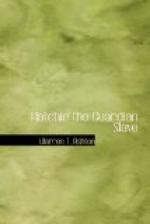The person who had thus obtained admission was the lawyer, Antoine De Guy, whom Maxwell had suggested as a fit agent for the execution of Jaspar’s scheme. He was certainly an odd-looking man. His face was of a very dark red color, much like that which is produced by the united effects of exposure and intemperance, and was encircled by a pair of black whiskers, intermixed with gray. His cranium was ornamented with a huge mass of the same parti-colored hair. His fiery red nose was placed in strange contrast with a pair of green spectacles, which entirely concealed the color and expression of his eyes. His clothes were of a most primitive cut, and had probably been black once, but were now rusty and white from long service. His form was portly, a little inclined to corpulency. His hands were most unprofessionally dirty; but this might have been occasioned by contact with the canoe in his passage. On one of his fingers glittered a diamond ring, which, considering the lack of ornaments in other respects, but ill accorded with the apparent parsimony of the man. It might, however, have been obtained in the way of trade, for Maxwell had hinted that he did business under the sign of the “three golden balls.” He was apparently in the neighborhood of five-and-forty, and looked like the debauchee in the face, while his dress indicated the penurious man of business.
“Did any one see you?” asked Jaspar, whose teeth were chattering with apprehension, notwithstanding his natural boldness.
“Not that I am aware of,” replied De Guy, in a silky tone, which, proceeding from such a form, would have astonished the listener.
“You met no one?” interrogated the anxious Jaspar.
“Not a soul! Everything was still.”
“Let us be sure of it. Step into this room for a moment. I will see that all the servants have retired,” said Jaspar, pushing his confederate into an adjoining apartment.
A light pull at the bell-rope brought to the library the body-servant of the late planter.
This “boy,” who was known by the name of Hatchie, was a mulatto. He was about forty years of age, and, having never been reduced to labor in the cane-fields, bore his age remarkably well. He was about six feet in height, very stout built, and was endowed with immense physical strength. His brow was a little wrinkled, and his head was a little bald upon the top,—and these were the only evidences of his years. His expression was that of great intelligence. In his countenance there was a kind of humility, to which his demeanor corresponded, that might have resulted from his condition, or have been inherent in his nature. He was a man who, even in a land of slavery, would be instinctively respected.




